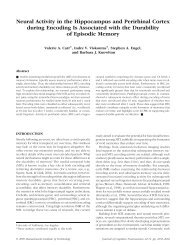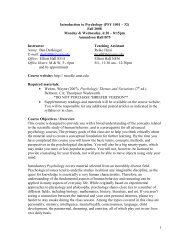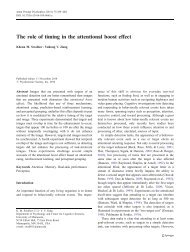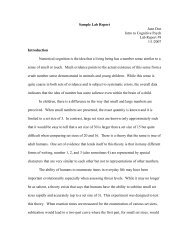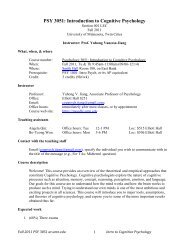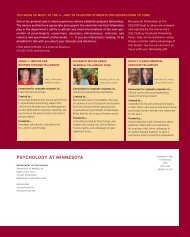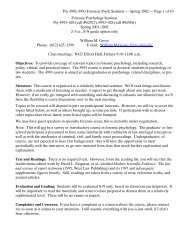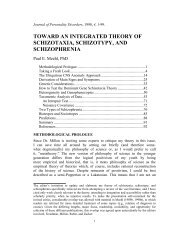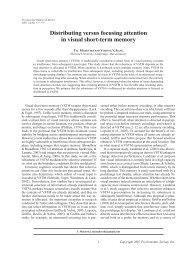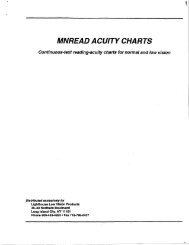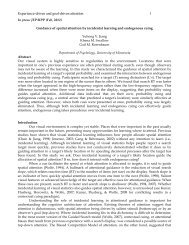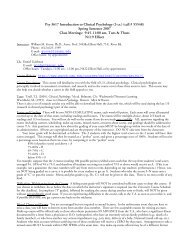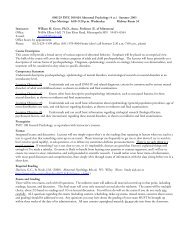PSY 3604 Syllabus - Department of Psychology
PSY 3604 Syllabus - Department of Psychology
PSY 3604 Syllabus - Department of Psychology
Create successful ePaper yourself
Turn your PDF publications into a flip-book with our unique Google optimized e-Paper software.
<strong>PSY</strong> <strong>3604</strong> <strong>Syllabus</strong>Spring Term 2012Class meeting times: Wednesdays, 6:20pm to 8:50pmMurphy Hall, Room 130Instructor:Ann Marie SchisselOffice Hour: Wednesdays 4:30pm – 5:30pmS344 Elliott Hall, 75 E River Roadschis013@umn.eduTeaching Assistant:Gilbert JewOffice Hour: Tuesdays, 1:15pm – 2:15pmN120 Elliott Halljewxx002@umn.eduCourse DescriptionThis course will provide an introduction and broad background to the classification <strong>of</strong>psychological disorders. Students will learn the classification system used in the DSM-IV-TR, as well as important diagnostic, etiological, and treatment related information.While etiology and treatment will be discussed in some detail, the bulk <strong>of</strong> the materialwill focus on the description and classification <strong>of</strong> psychological disorders. A prerequisitefor this course is <strong>PSY</strong>1001.TextsThere is one required textbook for this course.Butcher, J.N., Mineka, S., Hooley, J.M. (2011). Abnormal <strong>Psychology</strong>: Core Concepts.2 nd Edition.The Pearson Company also has a useful website including a multimedia library, practiceexams, etc. If you are interested in accessing this website, but bought a used book, youcan purchase access for the term for approximately $30. You do not need to haveaccess to this website for the course, but if you are interested in these features, thewebsite can be accessed through www.mypsychlab.comCourse WebsiteThe class website will be available through moodle, which can be accessed throughwww.psych.umn.edu/courses/ or www.myu.umn.edu. Lectures and grades can be foundhere.1
ExamsThere will be three exams: two midterms and a final.These exams will have a combination <strong>of</strong> multiple choice and short answer questions.There is a lot <strong>of</strong> material covered in this course, and if you do not attend lecture regularlyand study thoroughly, you will not do well on these exams.The two midterms will not be cumulative. 2/3 <strong>of</strong> the final will be non-cumulative(focused on the information discussed in class during the last third <strong>of</strong> the course). Theremaining 1/3 <strong>of</strong> the final will be cumulative.The two midterms will each be worth 120 points. The final will be worth 160.Therefore, there are a total <strong>of</strong> 400 points to earn in this course.GradesGrades in this course will be determined solely on performance on the three exams.Scores on each exam will be curved. The curving procedure is as follows: the top threescores from the course will be averaged. The difference between this average score andthe perfect score will be calculated and then added to each individuals score.Letter grades will be assigned as follows:A > 93.00%A – 90.00-92.99%B + 87.00-89.99%B 83.00-86.99%B – 80.00-82.99%C + 77.00-79.99%C 73.00-76.99%C – 70.00-72.99%D + 67.00-69.99%D 60.00-66.99%F C- to receive agrade <strong>of</strong> “S” in the course.I: An “Incomplete” will be granted only under very unusual circumstances. Poorcourse performance is not a sufficient reason for being granted an Incomplete.Extra Credit2
Students in this course will be allowed to earn Research Experience Program Points (Reppoints). This process involves volunteering for research studies in the <strong>Department</strong> <strong>of</strong><strong>Psychology</strong> for extra credit points. Students can earn up to 16 extra credit pointsthrough this program. For information about this program, and to view studies currentlyparticipating, please visit the website: https://filemaker.cla.umn.edu/PsyREP/projects.phpDifficulties; Withdrawing from the CourseBy itself, a poor exam score will NOT get you permission to drop the course. If youchoose to withdraw, do so before the date on which the instructor’s signature is required(see University Course Schedule for deadline). Incompletes (“I” grades), followed byretaking the course during another term to finish, will NOT be given except under themost unusual <strong>of</strong> circumstances. If you are experiencing difficulties in the course, talk tothe TA as soon as you realize it, and if at all possible, BEFORE you get a low test score.Missed Classes and ExamsAlthough there is no formal attendance policy, you must attend class meetings regularlyin order to do well in this course. While some <strong>of</strong> the lecture content will overlap with thetextbook, some will not. Material covered in either lecture or the readings is fair game forexams. Thus, you are responsible for material presented in lectures AND materialcovered in assigned readings. If you cannot avoid missing a class meeting, you mayobtain the lecture outline and any handouts from the missed class from the coursewebsite. However, you must arrange to borrow a set <strong>of</strong> notes from the missed class fromanother student. Neither the instructor nor the TA will provide copies <strong>of</strong> lecture notes orannouncement.There are FEW acceptable reasons for missing an exam. University policy is thatmidterm and final exams can be made up for legitimate absences, such as verified illness(or pregnancy-related issues), participation in other University-sponsored activities, juryduty, military service, and religious observances. Make-up exams will be <strong>of</strong>fered only tothose who obtain permission IN ADVANCE from the instructor, who have a significantillness documented by a letter from a health care provider, who have an extremely seriousfamily problem (e.g., death <strong>of</strong> a family member), or who have another very seriousimpediment as listed above. Bargain airline tickets bought in advance are not a validreason for a specially scheduled final exam. Students who miss an exam withoutsatisfying one <strong>of</strong> these conditions will receive a ZERO for that exam. Arrangements totake a missed exam MUST be made within ONE WEEK <strong>of</strong> the exam date. Any make-upexams <strong>of</strong>fered may be <strong>of</strong> a different format than the in-class exam, e.g., they may haveoral or essay questions. Missed make-up exams will be graded as ZERO, and will NOTbe rescheduled.A final exam conflict is defined by the University as consisting <strong>of</strong> (a) more than oneexam scheduled at the same time or (b) three exams scheduled within a 16-hour period.Students meeting either <strong>of</strong> these criteria may arrange to take their final exam early bycontacting the instructor well in advance <strong>of</strong> the final exam date. No student will beallowed to take the final exam later than the scheduled time.3
AccommodationsPlease call Disability Services (http://ds.umn.edu or 612-626-1333) if you require specialaccommodation for this course. You must provide the instructor with a letter detailingwhat accommodations you will require. Please notify the instructor as soon as possibleregarding any necessary accommodations. If any issues arise concerning your disabilityor the accommodation(s) to it, which cannot be settled with the course TA, feel free tocontact the course instructor about your concerns.Academic MisconductStudents are responsible to be familiar with the University’s policy on scholasticdishonesty, which can be found at http://advisingtools.class.umn.edu/manual/6_1_3.html.This policy will be vigorously enforced. Scholastic dishonesty includes plagiarism andcheating on exams. Consequences for students who are detected in the act <strong>of</strong> scholasticdishonesty can include failure <strong>of</strong> the course, and even more serious sanctions at theUniversity level.ScheduleNote that what follows is a tentative schedule <strong>of</strong> this semester’s topics. A specific week’sor day’s topic may change, and it is the student’s responsibility to become informed <strong>of</strong>any changes, as well as any other announcements or information disseminated in class.Exam dates are subject to change. Note that chapters are not covered in order and thatsome chapters may be skipped altogether. Readings are to be completed prior to thatday’s class meetings.Date Chapter Topic1/18 Ch 1,2 Introduction, History, and Abnormal <strong>Psychology</strong>Overview1/25 Ch 3 Diagnosis and Assessment2/1 Ch 14 Disorders <strong>of</strong> Childhood and Adolescence2/8 Ch 13 Cognitive Disorders2/15 MIDTERM I2/22 Ch 4(p.129-138),Ch 5Anxiety Disorders2/29 Ch 6 Mood Disorders3/7 Ch 12 Mood Disorders and Psychotic Disorders3/14 SPRING BREAK – No Class4
3/21 Psychotic Disorders3/28 Ch 8 Eating Disorders4/4 MIDTERM II4/11 Ch 7 Somat<strong>of</strong>orm and Dissociative Disorders4/18 Ch 9 Personality Disorders4/25 Ch 10 Substance Use Disorders5/2 Ch 11 Sexual Variants, Dysfunction5/9 FINAL EXAM, 6:30pm-8:30pmReferralsIf you (or someone you know) would like to talk with a pr<strong>of</strong>essional about a personal situation, here aresome numbers you can call.Boynton Health Services – Mental Health Clinic 612-624-1444Boynton Health Services – Urgent Consultation 612-625-8475Fairview-University Medical Center Emergency Room 612-672-6402University Counseling and Consulting Services (http://www.ucs.umn.edu) 612-624-3323109 Eddy Hall (Minneapolis) or 199 C<strong>of</strong>fey Hall (St Paul)Walk-in Counseling Center (WICC; www.walkin.org) 612-870-0565Crisis Connection (Phone counseling available 24 hours a day) 612-379-6363* The last three (UCS, WICC, and CC) are free services, and the WICC and CC do not require anyinsurance.5



